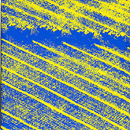| |

At Last I'm Free/Strange Fruit
1980
Robert Wyatt
|
|
|
| |
TELERAMA - 29 novembre 2016 - telerama.fr
Robert Wyatt (4), passion du fruit étrange -
Strange fruit (1980)
Les disques rayés, le blog musique de François Gorin
|
|
Une copieuse biographie de Robert Wyatt (Different every time, par Marcus O'Dair) vient de paraître et je vous la recommanderais bien, si sa lecture en traduction française n'était une telle épreuve. Dommage collatéral : un retour dudit Robert sous forme de disque rayé. On ne pouvait décemment faire le tour du Grand Schtroumpf en trois mouvements. Pour le consoler de la fin de Fidel Castro, poursuivons l'hommage. Il y a deux ans, deux volumes dont un de reprises par d'autres ou collaborations, récapitulaient l'œuvre sous le même titre Different every time. Les critères ayant présidé au choix du sommaire sont mystérieux. Par exemple, on y pointe At last, I am free (déjà traité ici), mais pas Strange fruit. Qui était la face B du premier, dans cette curieuse saison où Wyatt devint provisoirement un artiste à singles, chez Rough Trade. Or je me souviens d'un saisissement à l'écoute de Strange fruit, dont je ne connaissais à l'époque que la version de Billie Holiday. Déjà classique et qu'on pouvait croire définitive. Même la grande Nina Simone n'y a pas ajouté d'autre dimension, découvrirais-je plus tard. Le poème d'Abel Meeropol, un professeur juif et communiste du Bronx, signant sous pseudo (Lewis Allan) l'évocation déchirante d'un « fruit étrange » pendu à la branche d'un peuplier — le corps d'un Noir lynché —, semblait avoir trouvé son interprète idéale avec la dame au gardénia, alors quasi débutante. Chanté par Robert Wyatt d'une voix plus blanche que blanche mais non moins concerné par l'affaire plus de quarante ans après, Strange fruit a soudain une autre résonance. C'est un écho et un souvenir, c'est le fantôme d'une chanson et celui de l'image qu'elle fait naître et dépasse. Et ce spectre a pourtant une présence, une consistance qui peut laisser croire que les mots et la mélodie sont de la veille. C'est une interprétation plus qu'une reprise. Elle touche à chaque fois de la même façon, et vous hante même quand vous ne l'écoutez pas.
| |
THE GUARDIAN - 10 January 2013 - theguardian.com
Old music: Robert Wyatt – At Last I Am Free
George Chesterton
|
|
In which a hero of the English counterculture embraces the hedonistic disco of Chic, and plays a blinder.
This song involves a lot of heroes and is, in a way, about heroism itself. A ballad of psychological manumission, it was written by Nile Rodgers and Bernard Edwards for Chic's second album, 1978's C'est Chic. Chic were not merely masters of the disco sound, they embodied the best qualities of the disco ethos: unerring positivity, hope and – in the old fashioned sense of the word – the fantastic.
Rodgers and Edwards were two of my earliest musical heroes. The band's heavily cultivated image of sophistication and affluence was in part a response to the economic and social depression of late-70s New York, but this can't muddy the luminous wonder of their songwriting, musicianship and production, which went on to enhance – in some cases rescue – the careers of Sister Sledge, Diana Ross, David Bowie, Madonna, Duran Duran and many others (not to mention their huge influence on hip-hop).
I remember watching Top of the Pops open-mouthed as they mimed to I Want Your Love. Rodgers glued their sound together with his distinctive and often-copied rhythm guitar, Tony Thompson was that most unusual of beasts, a chic drummer, Alfa Anderson and Luci Martin provided the ice-cold vocals while all around them the piano and strings whirled and purred. The person who stood out the most was the much-missed Edwards, who played the bass with the élan of a funkified praying mantis.
So it seems a long journey from Chic's original seven minutes of At Last I am Free to the version by Robert Wyatt, which appeared on his 1982 singles and B-sides compliation, Nothing Can Stop Us. Wyatt is one of the great heroes of British counterculture, like a cross between an old English sheepdog and Pan. His blend of political commitment, an endearing folk twang and a sense of musical experiment and liberty has led to career of almost unrivalled range and influence. On this song he brings the heartbreaking honesty most people will recognise from his version of Shipbuilding, with a voice that somehow is at once shrill but deeply soulful and communicative. Around the central pillar of the vocals fall piano, organ and percussion lines that gently splish and splash then dissipate like ripples in water.
The lyrics speak of a failing relationship but the way Wyatt sings it could be about anything – any momentous parting or new beginnings. The line "I can hardly see in front of me" is one of those phrases in pop music that come along from time to time that mean almost nothing yet bulge under the weight of a thousand projected meanings for a thousand different listeners. It is an anthem for the turning of a page.
|

